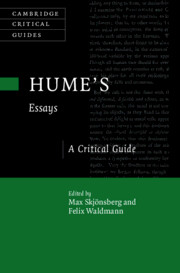Book contents
- Hume’s Essays
- Cambridge Critical Guides
- Hume’s Essays
- Copyright page
- Dedication
- Contents
- Figures
- Contributors
- Acknowledgements
- Abbreviations
- Introduction
- Part I Reception
- Part II Philosophy
- Part III Politics
- Part IV Political Economy
- Chapter 11 Hume and Population
- Chapter 12 Hume on Economic Inequality
- Chapter 13 Hume and the Politics of Money
- Bibliography
- Index
- Cambridge Critical Guides
Chapter 12 - Hume on Economic Inequality
from Part IV - Political Economy
Published online by Cambridge University Press: 02 January 2025
- Hume’s Essays
- Cambridge Critical Guides
- Hume’s Essays
- Copyright page
- Dedication
- Contents
- Figures
- Contributors
- Acknowledgements
- Abbreviations
- Introduction
- Part I Reception
- Part II Philosophy
- Part III Politics
- Part IV Political Economy
- Chapter 11 Hume and Population
- Chapter 12 Hume on Economic Inequality
- Chapter 13 Hume and the Politics of Money
- Bibliography
- Index
- Cambridge Critical Guides
Summary
Hume endorsed the long-standing belief that our mental and physical faculties are more or less equal at birth until distinguished by education. He was not an egalitarian, however; there would always be rich and poor, and property rights trumped compassion for the poor. Nevertheless, Hume strongly opposed the ‘utility of poverty’ doctrine as a hindrance to economic growth. Hume sought to raise the standard of living of the lower classes and to expand the ‘middle station’ of merchants and manufacturers. In several of his essays, he identified policies for trade and taxes to achieve these ends. In Britain, it was clear to Hume that commerce and trade, particularly of cloth, had already enabled labourers to lift themselves out of poverty through the acquisition of skills, and that this upward path might continue indefinitely. Hume’s desire to reduce the inequality of income was motivated by utilitarian ends: a more prosperous labouring class would result in a happier nation, not only because of the larger basket of goods in the household but also because citizens would become more law-abiding and thus promote representative government and political stability. Global prosperity would ensue as other nations became trading partners.
- Type
- Chapter
- Information
- Hume's EssaysA Critical Guide, pp. 224 - 246Publisher: Cambridge University PressPrint publication year: 2025

